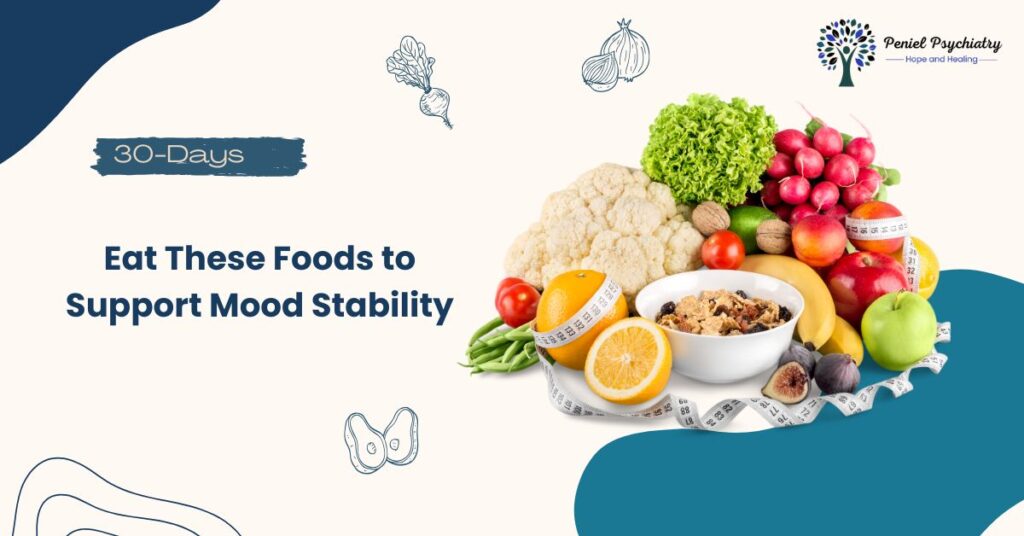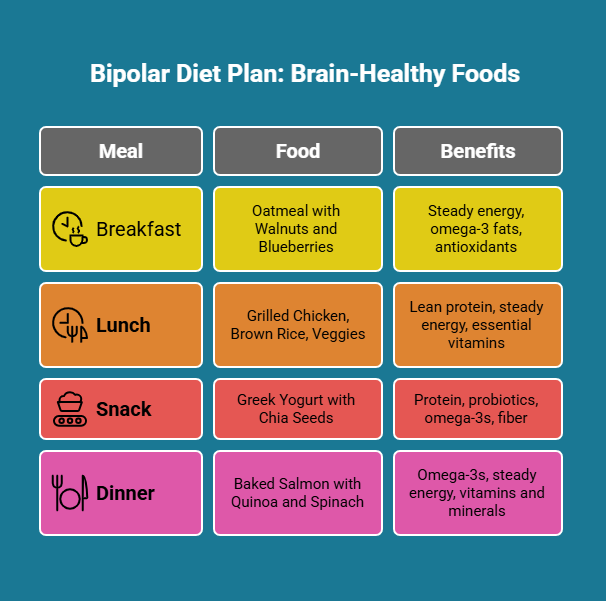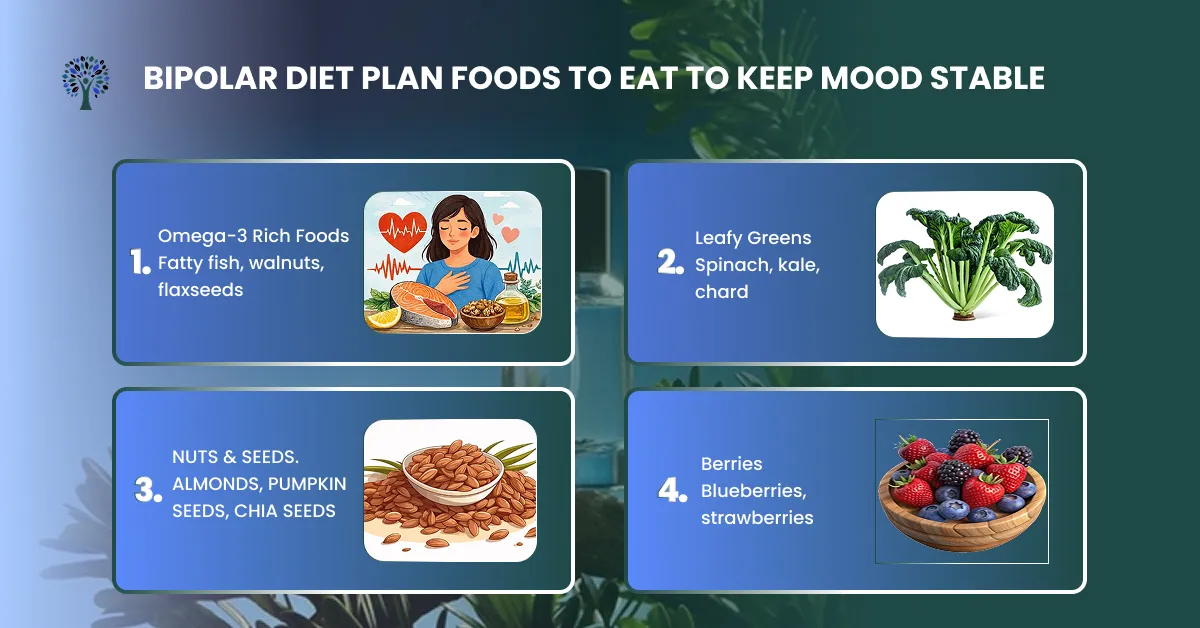Eating the right foods helps a lot when you follow a bipolar diet plan. What you eat can change your mood, energy, and focus. This is important for people with bipolar disorder. A steady diet of whole foods, healthy fats, and lean protein can help keep your brain clear.
It can also lower mood swings. No food can cure bipolar disorder, but good nutrition can support your treatment. In this guide, you will learn what to eat and what to avoid. Making a few wise food choices can improve your overall well-being every day.
Can Your Diet Help Manage Bipolar Disorder?
Food significantly affects how your brain functions and how you feel each day. When you eat regularly and choose healthy foods, you help maintain a steady mood. Skipping meals or eating junk food can cause your energy to drop fast. That makes mood swings worse.
Also, your gut and brain work closely together. A healthy gut means your brain gets better signals. This helps you think clearly and stay focused. That’s why the food you eat matters so much when managing bipolar disorder.
How Food Affects Your Mood and Brain
Certain foods help your brain work well. For example, foods rich in omega-3 fatty acids, such as salmon and walnuts, help maintain mood stability. Whole grains, such as oats and brown rice, provide steady energy and help keep your mind sharp.
Eating leafy greens and colorful vegetables provides your brain with essential vitamins, such as folate and magnesium. These nutrients help balance mood and keep you calm. Fermented foods, such as yogurt and kefir, can improve gut health. A good gut supports your brain, which can help lower mood swings.
Why Eating Regularly Matters
When you eat at regular intervals, your blood sugar levels stay steady. This helps you avoid sudden energy drops that can cause mood shifts. Protein at each meal, such as eggs or lentils, also keeps your blood sugar stable.
Skipping meals or consuming too much sugar and processed foods can cause your mood to fluctuate. Maintaining a regular eating schedule with balanced meals supports your mental health and helps your body function optimally each day.
Eat These Foods to Support Mood Stability
Choosing the right foods can help you maintain a steady mood. A bipolar diet plan focuses on foods that support brain health and reduce mood swings. Eating nutrient-rich meals helps your mind work better and your body feel stronger.

Omega-3 Rich Foods
Omega-3 fatty acids help your brain stay balanced. You can find them in foods such as salmon, walnuts, chia seeds, and flaxseeds. These foods may help lower depression and improve mood. Try adding them to your meals several times a week.
Whole Grains
Whole grains, such as oats, brown rice, and quinoa, provide a steady source of energy. They help keep your blood sugar stable and support your focus. These carbs digest slowly, so you won’t get sudden energy crashes that can affect your mood.
Leafy Greens and Colorful Veggies
Spinach, kale, broccoli, and other vegetables provide your brain with vitamins like folate and magnesium. These nutrients help reduce mood swings and support brain health. Fill your plate with lots of fresh, colorful vegetables.
Fermented Foods and Probiotics
Yogurt, kefir, and kimchi support your gut health. Since the gut and brain are closely connected, consuming fermented foods can help balance your mood. Try to incorporate these foods into your diet regularly.
Lean Protein
Add eggs, chicken, tofu, or lentils to every meal. Protein helps keep your blood sugar steady and your energy even. This can prevent mood swings caused by sugar highs and lows.
Avoid These Foods If You Live with Bipolar Disorder
What you avoid eating is just as important as what you include in your diet plan for bipolar disorder. Certain foods can make mood swings worse or interfere with your treatment. Staying away from these can help keep your mood steady and support your mental health.
Refined Sugar
Sugar can cause sudden spikes and crashes in your blood sugar levels. These rapid changes may lead to mood swings and feelings of anxiety or irritability. Avoid sweets, sodas, and processed snacks that contain excessive amounts of added sugar.
Caffeine
Excessive caffeine consumption can cause feelings of anxiety or restlessness. It may also cause trouble with sleep, which is very important for managing bipolar disorder. If caffeine affects you negatively, try reducing your intake or switching to low-caffeine alternatives.
Alcohol
Alcohol can interfere with your medications and affect your mood. It may also disrupt your sleep and increase feelings of depression or mania. Limiting or avoiding alcohol helps your body and brain stay balanced.
Processed and Fast Foods
Processed foods and fast foods often contain unhealthy fats and additives. These can cause inflammation in your body and brain. Eating these foods regularly may exacerbate symptoms. Instead, focus on whole foods that nourish your brain and body.
Avoiding these foods won’t cure bipolar disorder. But steering clear of them supports your mental health and helps keep your mood steady. Small changes like these can add up over time.
Try This Simple 1-Day Meal Plan for Bipolar Stability.
A well-balanced bipolar diet plan is most effective when you consume balanced meals throughout the day. Eating at regular times helps keep your blood sugar steady and your mood more stable. Here’s an easy meal plan you can try that focuses on brain-healthy foods.

Breakfast: Oatmeal with Walnuts and Blueberries
Start your day with oatmeal. It’s a whole grain that gives you steady energy. Add walnuts for omega-3 fats, which help support your brain. Blueberries add antioxidants and a touch of sweetness without too much sugar.
Lunch: Grilled Chicken, Brown Rice, and Steamed Veggies
For lunch, try grilled chicken for a lean protein option. Brown rice is a whole grain that helps maintain steady energy levels. Add steamed vegetables like broccoli or spinach for essential vitamins, such as folate and magnesium, which support mood balance and overall well-being.
Snack: Greek Yogurt with Chia Seeds
A small snack of Greek yogurt gives you protein and probiotics to help your gut health. Chia seeds add omega-3 fatty acids and fiber, which support digestion and brain function.
Dinner: Baked Salmon with Quinoa and Spinach
End your day with baked salmon, a great source of omega-3 fatty acids. Quinoa is a whole grain that provides a steady source of energy. Spinach adds more vitamins and minerals that help keep your brain healthy.
Eating balanced meals like these helps keep your mood steady. It’s simple, healthy, and fits well with a bipolar diet plan.
Build a Routine That Supports Your Brain
Eating the right foods helps, but how you eat matters a lot, too. Having a balanced routine with regular meals and good habits can make a big difference in managing bipolar disorder. A steady routine helps keep your energy and mood more stable.
Eat Meals at the Same Time Every Day
Try to eat your meals around the same time each day. This helps keep your blood sugar steady and prevents sudden mood swings. Regular meals also help your body get into a healthy rhythm. Skipping meals or eating at random times can cause mood changes.
Stay Hydrated Throughout the Day
Drinking enough water is a simple yet essential step. Dehydration can cause fatigue and impair your concentration. Keeping hydrated supports your brain and helps you think clearly.
Avoid Skipping Meals or Overeating
Skipping meals can cause your blood sugar to drop, which can trigger mood swings. Overeating, especially of sugary or processed foods, can also lead to energy crashes. Eat balanced meals that include protein, whole grains, and vegetables to maintain steady energy levels.
Plan and Prepare Meals Ahead of Time
Planning meals ahead of time can help you avoid unhealthy choices. When you have healthy meals ready, it’s easier to stick to your bipolar diet plan. Meal prep can also save time and reduce stress.
Building these habits supports your mental health. They help you feel more balanced and ready to manage bipolar disorder day by day.
Talk to a Doctor or Dietitian If You Need Help
Managing bipolar disorder with a good diet is helpful, but sometimes you need extra support. Consulting with a doctor or dietitian can provide you with personalized advice tailored to your specific health needs. They can guide you on using nutrition in conjunction with your medications and treatment plan.
How Medications Can Affect Your Diet
Some bipolar medications can change your appetite or cause weight gain. These effects can make it more challenging to adhere to a healthy diet. A doctor or dietitian can help you find ways to manage these changes without harming your mental health.
Getting Personalized Nutrition Advice
Everyone’s body and needs are different. A dietitian can create a meal plan just for you. This plan can focus on foods that support your brain and mood. They can also suggest vitamins or supplements if you need them.
Using Food as Part of Your Treatment
Good nutrition is a tool, not a cure. It works best when combined with therapy, medication, and lifestyle changes. A healthcare professional can help you put it all together in a way that fits your life.
Consulting with experts helps you make informed decisions about your food choices. It can also give you confidence that your bipolar diet plan is safe and effective. Don’t hesitate to ask for help when you need it.
Book your appointment today to consult with mental health experts. Get personalized support and guidance for managing bipolar disorder with care that fits your needs.
FAQs About Diet and Bipolar Disorder
Can I manage bipolar disorder with diet alone?
A diet supports treatment, but it can’t replace medicine or therapy. Use food as part of a bigger plan to manage bipolar disorder well.
What diet type is best for bipolar disorder?
A diet rich in whole foods, omega-3 fatty acids, lean protein, and a variety of vegetables helps maintain a steady mood and supports brain health.
Do vitamins like magnesium or B12 help?
Some vitamins may help improve mood and energy, but always consult your doctor before adding supplements to your routine.
How fast can diet changes affect mood?
Mood improvements from diet vary. Some people see changes in weeks, while others may take longer. Consistency helps get the best results.
Can I have cheat meals?
Yes, occasional treats are fine. Balance and regular healthy eating matter more than being perfect all the time.
Final Thoughts
Eating well can help support your mental health when you have bipolar disorder. A balanced bipolar diet plan, consisting of whole foods, healthy fats, and regular meals, helps maintain a steady mood. While food alone won’t cure bipolar disorder, it works well with your treatment.
Small changes in what you eat and how you eat can make a big difference over time. Focus on building good habits and listening to your body. Remember, healthy eating is just one part of your care, but it is an important one.




